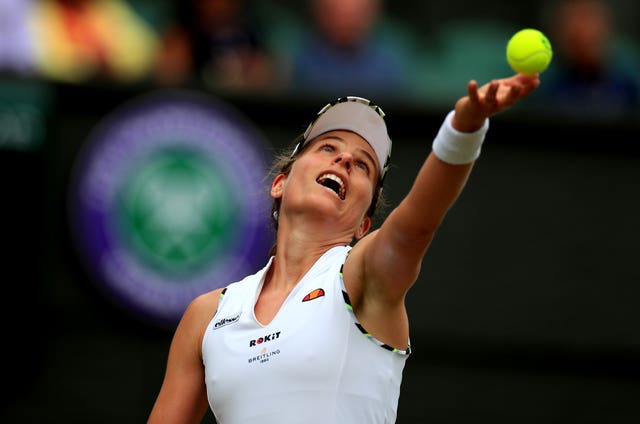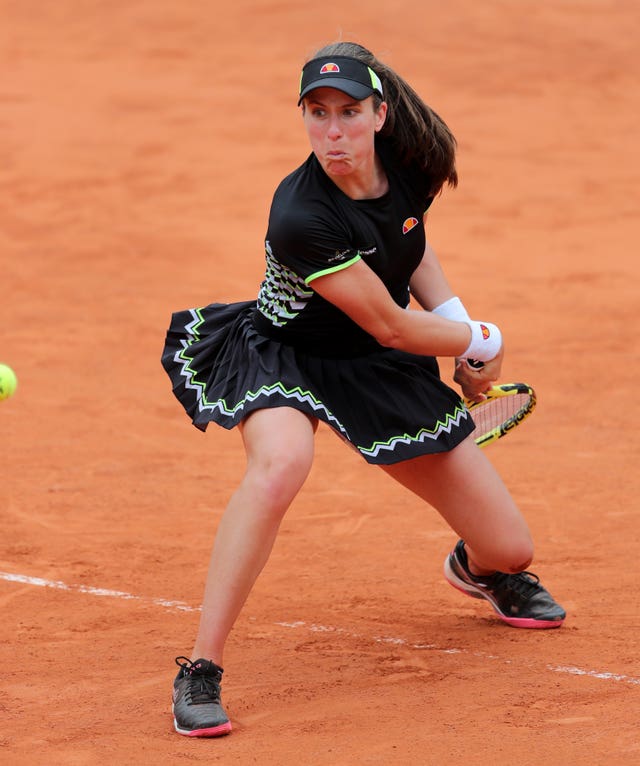Johanna Konta fears tennis might not get back to normal for the rest of her playing career.
The British number one is preparing for the French Open, which begins on Sunday having shifted from its usual springtime slot in the calendar because of the coronavirus pandemic.
It will be only Konta's ninth tournament of an interrupted season, with the tour forced to take a complete break between March and August.
Hopes that the situation might have eased substantially by 2021 have rapidly faded and Konta would not be surprised to see difficulties and restrictions continue for several years.
The 29-year-old told the PA news agency: "There's a very big hopefulness that come January 1, 2021 everything's going to be normal and unfortunately it's not the case.
"It's going to be very difficult and very different for a long time, possibly for the rest of my playing career. But hopefully in time, not just tennis and not just sport but everyone will find a way to come through this, or live alongside it depending on what route this period of time takes."
China's decision not to hold any international sporting events in 2020 was a major blow for the WTA, with most of the tour's autumn calendar taking place in Asia including the lucrative WTA Finals in Shenzhen.
Konta is hoping to play in the Ostrava Open next month, which currently is the only tour-level event scheduled for the rest of the year.

"I know they are trying to relocate tournaments for one year only and bring opportunities but it's always going to be an uphill battle because it's just the nature of what our season looks like," said the British number one, an ellesse athlete.
"I think the men have a lot of opportunities still in Europe but that's what their season already looks like. We got the short end of the stick there but that's just the reality of what we have going on in the world."
Konta is well-placed to discuss what a difficult time this has been for tennis and the WTA thanks to her position on the player council.
While the players were stuck at home, Konta was involved in discussions around how the sport could get going again.
"It was incredibly busy and very stressful," she said. "At one point we were having two or three calls a week for weeks on end. And we weren't even in the most stressful situation so you can only imagine what (chief executive) Steve Simon and everyone else in management must have been going through.
"I don't think they've had a day off since January. We owe a lot of credit to the way they've been able to bring our sport back and especially with the challenges we have with our sport with how international it is."
Bonjour Paris 🇫🇷👋 pic.twitter.com/zCo78TlXFh
— Johanna Konta (@JohannaKonta) September 23, 2020
Things will certainly not be normal at Roland Garros. As well as the autumnal conditions, players face strict measures in a bid to prevent the spread of Covid-19 in a city where cases have soared in recent weeks.
Konta experienced similar restrictions at the US Open, where players were not permitted to leave their hotel apart from to go to Flushing Meadows.
She said: "In the US I think they did a really good job. It's definitely challenging and it's draining. Staying at the hotel and being there the whole time with everyone takes quite a bit of energy so you have to manage that."
The United States Tennis Association was praised for managing to run its grand slam without too many hiccups.
Thank you @usopen for giving us the opportunity to compete at a Grand Slam again. ðŸ™ðŸ‡ºðŸ‡¸ pic.twitter.com/UzxjD6HEsD
— Johanna Konta (@JohannaKonta) September 3, 2020
Frenchman Benoit Paire tested positive on the eve of the tournament, resulting in several players he had been in contact with facing restrictions and eventually having to quarantine.
The French Tennis Federation has made clear that any player testing positive, or who has been in close contact with a team member who tests positive, will be barred from competing.
That has already impacted several players in qualifying and Konta said: "We know it's a possibility.
"Everyone is doing their best for it not to happen but by going to a tournament you essentially take responsibility. If it's going to worry you that much then it's a serious conversation of whether you want to go or not.
"I still have some anxiety about it but maybe I was on the lower scale. There's things I'm doing to keep myself safe, to keep my loved ones safe, and as long as I'm adhering to those things, I'm going to try and do my job the best that I can and live my life the best that I can."

The French Open usually comes at the end of two months of clay-court events, whereas this year that has been condensed to two weeks.
Konta played her only warm-up event at the Italian Open in Rome last week, losing in the second round to Garbine Muguruza.
She said: "We've known it was going to be like this for some time. It's not ideal, it's not comfortable, but it's not ideal or comfortable for anyone so it's just going along with that and keeping in mind that at least we're playing."
Clay had been by some distance Konta's least successful surface until last year, when she found her feet spectacularly with runs to the finals in Rabat and Rome before reaching her third slam semi-final in Paris.
"I'd played some great matches in Rabat which helped me in understanding what I do well on the hard courts and grass courts, I also do well on the clay courts," said Konta.
"There's a lot of good things to take from there but obviously nothing is guaranteed year on year.
"It's a very different French Open. It's going to be a bit of an adjustment and a change in mindset but I am looking forward to going back on site. I'm sure I'm going to have really nice memories from last year.
"Being in a place where you have really good memories of playing well, of some success, that can only give you energy."
/https%3A%2F%2Fsportsmole-media-prod.s3.gra.io.cloud.ovh.net%2F20%2F04%2Fjohanna-konta.jpg)
/https%3A%2F%2Fsportsmole-media-prod.s3.gra.io.cloud.ovh.net%2F24%2F41%2Frafael-nadal_1.jpg)
/https%3A%2F%2Fsportsmole-media-prod.s3.gra.io.cloud.ovh.net%2Fuploads%2F2025%2F06%2Fimago1062876256-1-6846b148641b8269046987.jpg)
/https%3A%2F%2Fsportsmole-media-prod.s3.gra.io.cloud.ovh.net%2Fuploads%2F2025%2F06%2Fimago1062818924-1-68446f536f70f898953416.jpg)
/https%3A%2F%2Fsportsmole-media-prod.s3.gra.io.cloud.ovh.net%2F25%2F23%2Fcarlos-alcaraz.jpeg)
/https%3A%2F%2Fsportsmole-media-prod.s3.gra.io.cloud.ovh.net%2Fuploads%2F2025%2F11%2Fjannik-sinner-reacts-at-the-atp-finals-on-november-10-2025-marco-canoniero-69127a5832e3b742041832.jpg)
/https%3A%2F%2Fsportsmole-media-prod.s3.gra.io.cloud.ovh.net%2Fuploads%2F2025%2F11%2Fcarlos-alcaraz-reacts-at-the-atp-finals-on-november-11-2025-marco-canoniero-6913c6df0284b816368765.jpg)
/https%3A%2F%2Fsportsmole-media-prod.s3.gra.io.cloud.ovh.net%2Fuploads%2F2025%2F11%2Falex-de-minaur-celebrates-his-win-at-the-atp-finals-on-november-13-2025-marco-canoniero-69173c4065d4e844185148.jpg)